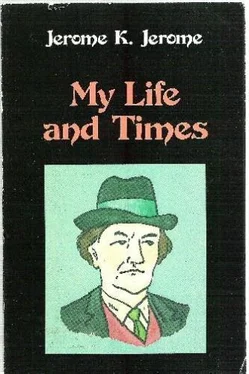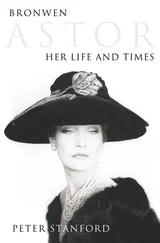It was one Dan of the lower third who first disturbed my religious beliefs. He came from the neighbourhood of Camden Town, and generally we would meet in the outer circle, and walk together across the park. It was nearing the end of the summer term, and examinations were in progress. I confided to him my reason for being sure that I was going to win the arithmetic prize. Every night and morning on my knees I was praying for it. My mother had explained to me the mountain failure. I had not understood the verse properly. God only grants blessings that are good for us. Now here was something that was good for me. God Himself must be able to see that. My father was keen about my winning the arithmetic prize: he had said so. And this time I really did believe. I hadn't really expected the dust-heap to disappear, but the arithmetic prize I regarded as already mine. Dan argued that I wasn't playing the game. If the arithmetic prize was to be decided by prayer, then what was the use of working? The boy who had swotted hard all the term could be out-distanced, in the end, by any lazy beggar putting in ten minutes on his knees just before the examination. And suppose two boys prayed for it, both believing. What would God do then?
“Don't see the good of working at anything, if you can get everything you want by praying,” concluded Dan.
It was a new light on the subject. Something was wrong somewhere. I thought at first of putting the problem before my mother, but felt instinctively that she would not be able to answer it: not to my help. I had got to fight this thing out for myself. And I didn't win the prize. I didn't try: I didn't seem to want it, after that.
William Willett was one of my schoolmates. I take it William Willett did more to give pure enjoyment—both mental and physical—to the people, than all the forces of Parliament, Press and Pulpit put together during the last hundred years. But already evil hands are trying to undo his work. The Devil will never rest till he has killed the Daylight Saving Bill.
In holiday time, I took up again my wanderings, my season ticket enabling me to extend my radius. They hunted the deer round Highgate in those days. I remember sitting on a stile near the Archway and seeing the van drive up and the stag unloosed. Hampstead was a pleasant country town, connected with London by a three-horse 'bus. A footpath led from Swiss Cottage, through corn fields, to Church Row; and a pleasant country road, following a winding stream, led to the little town of Hendon. I was always a good walker. It was lonely country between Wood Green and Enfield. Once I fell into a snowdrift, just beyond Winchmore Hill. Fortunately some farm labourers heard my call, and came to my rescue. Walthamstow lay far off, surrounded by marshes, where cattle grazed. There was a fine old manor not far from Edmonton. I trespassed there one day. Old houses have always had a lure for me. The owner himself caught me; but instead of driving me off, took me into the house and showed me all over it. He told me how he had often passed it on his way to work, when he was a boy, apprenticed to a carpenter: and how he had dreamt dreams. I came to be a visitor there, right till the end. He had worked his way up by saving and hard work; had never smoked, had never drunk, had rarely played. At sixty—two years before—he had tasted his first glass of champagne; and at sixty-five he died, having drunk himself to death. A kindly old fellow, with a touch of poetry in him. He was passionately fond of music, and had built himself an organ room. He left a young wife and two children. The place is a boarding-house now. Hackney was a genteel suburb. At the Claptons, quite good class people dwelt. Of afternoons, they took the air in roomy carriages they called barouches, drawn by great glossy horses that pranced and tossed their heads. At Highbury there used to be a fair with open-air dancing—and cock fighting, it was said.
There was a strange house I came upon one afternoon, down by the river. It was quite countrified; but how I got there I could never recollect. There was an old inn covered with wisteria. A two-horse 'bus, painted yellow, was drawn up outside. The horses were feeding out of a trough, and the driver and conductor were drinking tea—of all things in the world—on a bench with a long table in front of it. It was the quaintest old house. A card was in the fanlight, over the front door, announcing “Apartments to let.” I was so interested that I concocted a story about having been sent by my mother; and asked to see the rooms. Two little old ladies answered me. All the time they kept close side by side, and both talked together. We went downstairs to a long low room that was below the ground on the side of the road, but had three windows on the other, almost level with the river. A very old gentleman with a wooden leg and a face the colour of mahogany rose up and shook me warmly by the hand. The old ladies called him Captain. I remember the furniture. I did not know much about such things then, but every room was beautiful. They showed me the two they had to let. In the bedroom was a girl on her knees, sweeping the carpet. I was only about ten at the time, so I don't think sex could have entered into it. She seemed to me the loveliest thing I had ever seen. One of the old ladies—they were wonderfully alike—bent down and kissed her; and the other one shook her head and whispered something. The girl bent down lower over her sweeping, so that her curls fell and hid her face. I thanked them, and told them I would tell my mother, and let them know.
I was so busy wondering that I never noticed where I walked. It may have been for a few minutes, or it may have been for half an hour, till at last I came to the East India Dock gates. I never found the place again, though I often tried. But the curious thing is, that all my life I have dreamed about it: the quiet green with its great chestnut tree; the yellow 'bus, waiting for its passengers; the two little old ladies who both opened the door to me; and the kneeling girl, her falling curls hiding her face.
I still believe that one evening, in Victoria Park, I met and talked with Charles Dickens. I have recorded the incident fairly truthfully in “Paul Kelver.” He was certainly most marvellously like the photographs; and he did say “Oh, damn Mr. Pickwick!” Around Poplar, town and country were struggling for supremacy. There were little dismal farms scattered about the marshes. An old man in a yellow smock, driving before him three or four cows with bells round their necks, used to pass our house every morning and evening. He had his regular customers who would come out with their jugs: and he would milk the cows in the street. One summer, a boy and a girl came with a herd of goats. But they were not so successful. The goats would not stand still to be milked, and were always straggling. There was trouble in the world even before Lloyd George's Limehouse speech. I remember the long processions of the unemployed. They didn't run to a band, but sang a dreary dirge:
“We've got no work to do—oo—oo, We've got no work to do—oo—oo, We're all of us poor starving men, We've got no work to do.”
My mother's diary is still sad reading during all these years. My father fell ill. The long walk to and from the city each day was too much for him. Often I would go to meet him; and he would be glad of my arm.
Outside “The George” in the Commercial Road there used to sit a little clean old lady who sold pig's trotters, cooked, at three halfpence apiece. Sometimes we would take three home with us. My mother would warm them, and I would be sent out to where a baked potato man stood at the corner of Pigott Street, calling to the passers-by: “'Ere you are, 'Ere you are. Warm your 'ands and fill your belly for one 'alfpenny.” And so we would feast and make merry. One reduces one's denominator. The result is much the same.
Читать дальше










